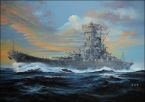Jaroen
Posts: 169
Joined: 6/23/2008
From: Amsterdam
Status: offline

|
I'm not good at rigging an easy, yet adequate, test with WitP but I gave it a shot.
Of course this is about checking if my game experience with the newly introduced pre-CAP flak is anything true to my expectations. Generally speaking I'd expect that US naval AAA is more effective than Japanese naval AAA. This difference in effectivity is progressively stronger in favour of the USN with the war progressing.
Not knowing how to set up a fresh testing environment I used the Coral Sea scenario and changed all aircraft devices to have no effect or being duds. This allowed for CAP flying triggering the pre-CAP flak but not doing any damage. In addition both AM and PM attacks were resolved because all carriers were still flying the surviving planes. On the Japanese side I had 2 CV's (Zuikaku + Shokaku), 2 CA's (Myoko + Haguro) and 6 DD's (Shiratsuyu, Shigure, Yugure, Ariyake, Akebono + Ushio) totalling an AA strength of 3046 points. On the USN side I had 2 CV's (Lexington + Yorktown), 1 CA (Chacago) and 6 DD's (Anderson, Hammann, Morris, Sims, Dewey + Aylwin) for a total AA strength of 3050. The Japanese had 81 attacking planes (42 x Val + 39 x Kate) and the USN 88 (64 x SBD + 24 x TBD) since I used some VS parts to actually do some scouting. Plane altitudes were similar for Jap and USN (bombers 12k, torpedo 8k).
I'm afraid I ended up with only 5 results I have confidence in. The rest returned exactly the same results so I dropped all those. Aparently the game engine somehow returns te same results from the one save I had so I needed to change some settings before running a turn. Very time consuming and I don't know how to be more efficient with this. Sometimes I changed a fleet move but still found the same results so I gave up and just use the 5 good results I have.
What were those results?!
To start with, pre-CAP flak was present every attack, i.e. 10 out of 10.
On average the Japanese had 47,8 planes hit by AAA out of 81 (59%).
On average the USN had 66,4 planes hit by AAA out of 88 (75%).
That is counting all hits from AM and PM together including killed and damaged planes taken from the air unit information screens. About 1/3 of those hits are kills the rest are write-offs or damaged-only planes. I find these difference in hits big enough to be significant and don't think doing 95 more results will change it much. But, that's only talk if it's not put to the test.
Because I was thinking damage would influence attack efficiency as well I counted the bomb/torpedo hits too. Those were all duds so I counted them from the combat replay with FOW delivering a lot of uncertainty. But I wanted to have at least something to go with. On average the Japanese hit 14,4 times and the USN hit 11,2 times per turn (AM + PM). Not fully significant but pretty close.
Conclusions?!
Not much data to go with really but there is a trend and it's supporting my experience that pre-CAP flak is NOT making Japanese AAA weaker than the USN AAA. Compared with the results of Puhis (no pre-CAP flak) it also shows a stronger difference in AAA effect, with the pre-CAP flak adding more strength and extra hits. In addition I do see a noteworthy difference in the number of bomb/torpedo hits produced. I think that the Japanese AAA efficiency is a very important reason for that all other things being about equal. But just those averages from 5 results is perhaps not strong enough a basis to finalize the question. Definately not scientifically but it's good enough for me! It supports my in-game findings and seems to be experienced the same way by many others. In my opinion therefore it would be good to look into the design to see if the AAA effectiveness could be balanced more towards the USN.
Final remarks.
There are still unknowns like the way the game engine is running AAA (is the AA rating all that matters???) and bomb/torpedo targeting. But in the end I do like the lethality of the AAA such as the USN is suffering with the pre-CAP flak. Add in the extra damage/kills by CAP and it's getting very close to historical possible endings I think. It hurts . . . and it should hurt at least as much for the Japanese.
|
 Printable Version
Printable Version









 New Messages
New Messages No New Messages
No New Messages Hot Topic w/ New Messages
Hot Topic w/ New Messages Hot Topic w/o New Messages
Hot Topic w/o New Messages Locked w/ New Messages
Locked w/ New Messages Locked w/o New Messages
Locked w/o New Messages Post New Thread
Post New Thread